* originally published in Feb. 2018. Updated Feb. 2024
Gary Bettman gets booed when he speaks. A lot. He was the public face behind the decision not to allow NHL players to participate in the 2018 Olympics. When an owner wants public funds used to finance a new arena, Bettman makes the case in the media. He has led the NHL through three lockouts and supported the league to expand into non-traditional hockey markets with mixed results.
He has also been behind new television deals, expanded access to the game, and masterminded new events. As the NHL Commissioner, he represents the owners of NHL teams. Yet, from the moment he took office in 1993 to the present day, NHL fans have been keen to show their distaste.
Is the NHL thriving under Gary Bettman? While many fans might say no, his contributions over the last 31 years are significant.
The Case Against Gary Bettman
Bettman was hired as the NHL’s first Commissioner with a mandate to end labor unrest (from ‘HOCKEY; Opening Day for N.H.L.’s First Commissioner,’ New York Times, 02/02/1993). Instead, his three-decade tenure has turned out to be the most unsettled of any major professional sports league.
Lost Seasons: 1993-94 and 2004-05
In 1993-94, during his second season at the helm, the NHL lost 103 days of play during a lockout. In 1995, the league agreed at Christmas to play an abbreviated 48-game schedule. The lockout had furthered economic upheaval. The LA Kings declared bankruptcy and owner Bruce McNall went to jail. The Quebec Nordiques were on their way to Denver, and the Winnipeg Jets were on the tenuous ground.
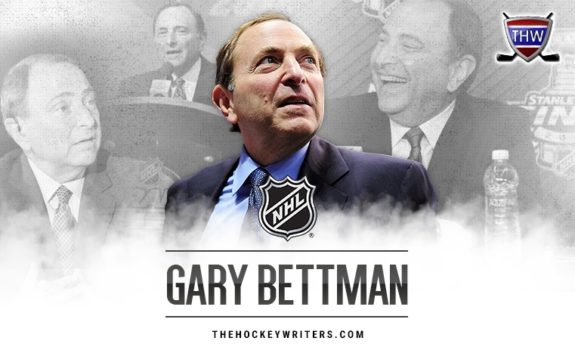
While player salaries had increased following the ’94 lockout, Bettman did nothing to challenge the notion that NHL players were “privileged millionaires.” In 2004, the owners refused to negotiate and the season was canceled. The NLHPA disintegrated into rival factions and the owners were able to institute a salary cap. Before 2004, players could sign with the team willing to pay market value for their services. A hard salary cap was instituted and the players took a pay cut. The owners made more and kept more. Fans lost a season.
The 2012 NHL Lockout
In 2012, the lockout issues were slightly different. The owners sought to reduce the players’ guaranteed 57% share of hockey-related revenues, introduce term limits on contracts, eliminate salary arbitration, and change free agency rules. By 2012, public perception was not on the owners’ side. Owners lost between $8 million and $10 million a day in revenue but would go on to negotiate a 50-50 split of hockey-related revenue under the new Collective Bargaining Agreement. This translated to well over $2 billion over a 10-year CBA.
Players lost around 40% of their wages for the lockout season and additional revenue going forward. No matter how you spin this, players have a smaller share of total dollars and fewer contract rights than they had before the lockout. One winner was expansion teams. New rules placed a seven-year cap on individual contracts and a 35% year-to-year variance limit on contracts. The reduction of the salary cap helped other smaller market teams as well. In Canada, however, businesses in areas with NHL teams were hurt because of the lockout.
Insistent Hockey Expansion into Non-traditional Markets
When Bettman took over in 1993, the NHL had expanded to 24 teams. The Florida Panthers and the Anaheim Mighty Ducks were both poised to join the league.
Early in Bettman’s watch, the league added the Nashville Predators, Atlanta Thrashers, Minnesota Wild, and Columbus Blue Jackets, while moving the Minnesota North Stars to Dallas, the Nordiques to Denver, the Jets to Phoenix, and the Hartford Whalers to North Carolina. However, these expansion teams found mixed success.
The Thrashers, for example, only survived in Atlanta for about 12 years before a combination of poor attendance, mismanagement off the ice, and a difficult arena situation eventually forced the team to move out of Atlanta for the second time. While this relocation brought a team back to Winnipeg, it is still seen as one of the biggest missteps of the Bettman era.
Arizona and Arenas
Another area of continuing concern is in Arizona. On top of bearing the weight of being the dearly departed original Jets, the Coyotes franchise has been plagued with problems from the outset. Their original home at the AmericaWest Arena was not well-suited for hockey and their current home in Tempe is 20 minutes from Phoenix. They are still searching for their long-term home.
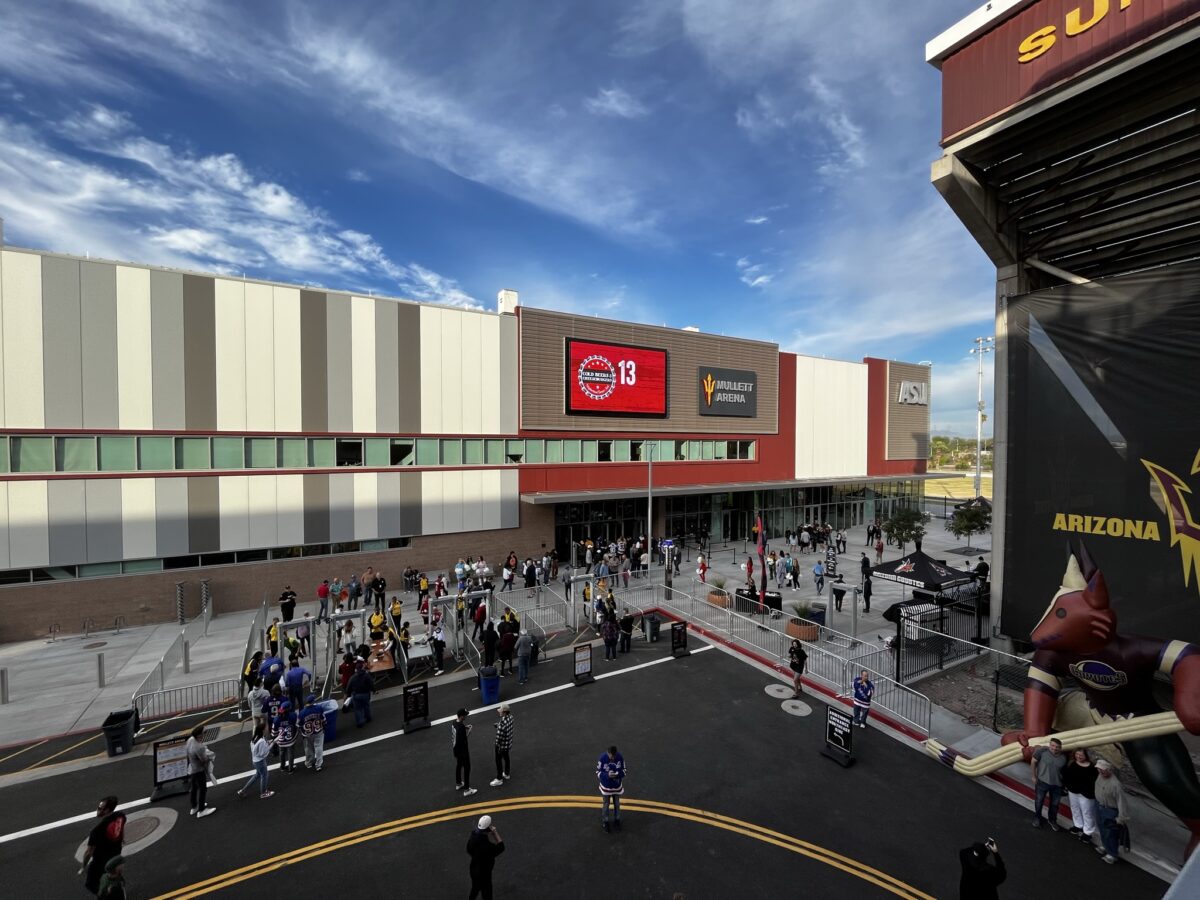
Despite the Auston Matthews phenomenon, hockey is not indigenous to the desert, and the Coyotes have struggled to build a fanbase due once again to a combination of inconsistent output on the ice and struggles to break into the cultural zeitgeist off it.
Perceived Disrespect of Canadian Franchises
Much to the chagrin of Canadian fans, during the Bettman years, the Sunbelt teams have been a lot more successful in the playoffs than their Canadian brethren. For example, the Tampa Bay Lightning have won the Stanley Cup three times in the last 20 years, the Carolina Hurricanes claimed the first Cup after the lockout in 2006, and the Ducks followed in 2007.
This lack of ultimate success and team relocations has fueled a belief that the diminutive American has little respect for Canada and Canadian fans.
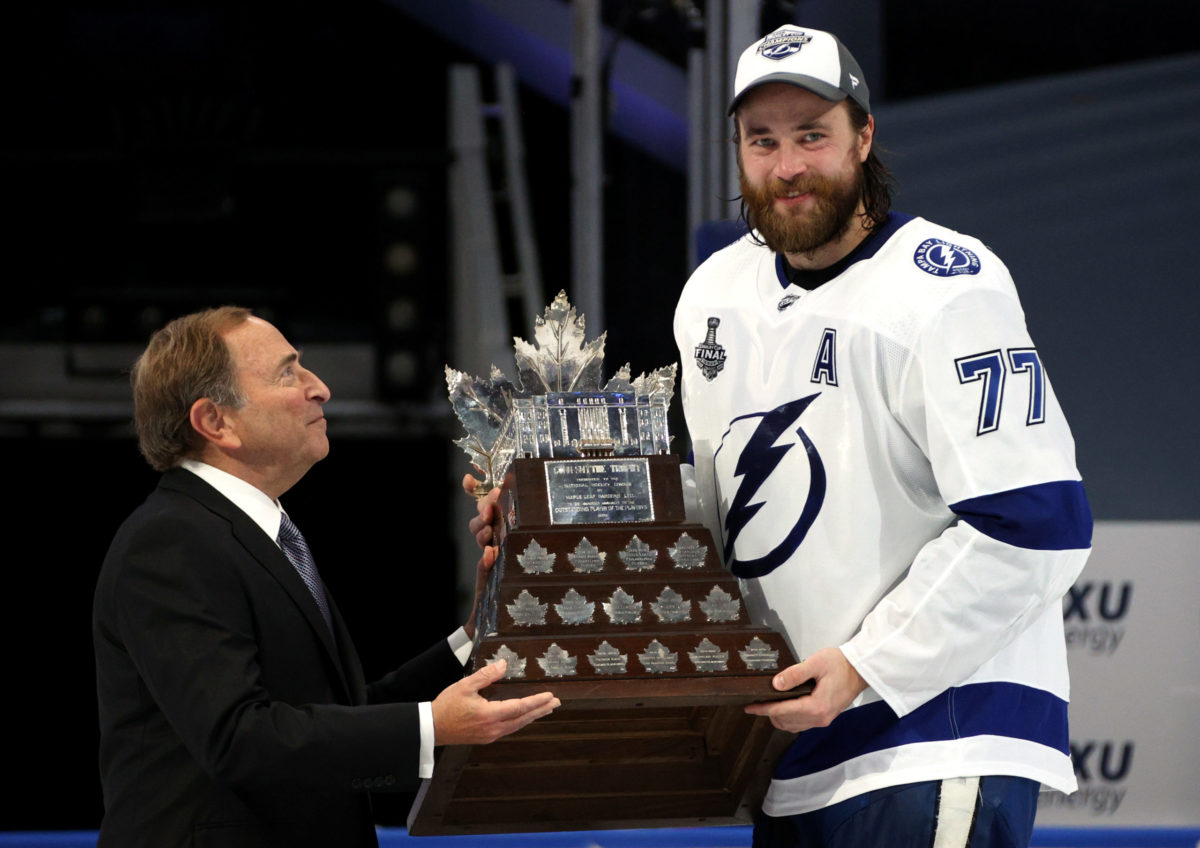
Many Canadians have not forgiven Bettman for relocating the Jets to Phoenix or the Nordiques to Colorado early in his tenure or for blocking the potential relocation of the Predators to Hamilton. While the return of the Jets has been lauded, rumblings continue that Quebec City is being kept from reclaiming a franchise.
In Defense of Gary Bettman
The success or failure of hockey teams in non-traditional markets shouldn’t be used to criticize Bettman. However, most fans would agree his focus has been to grow the business of hockey and not to protect the special connection that Canadians have with the game. This, of course, is not his remit. Bettman’s legacy must be based on his record to expand the game.
NHL Exposure on TV
The NHL has done a phenomenal job at marketing itself ever since the 2004-05 lockout. A lot of that can be credited to the commissioner himself. Prior to the 2004-05 lockout, the NHL had a TV contract with ESPN and ABC in the United States. That was nothing short of a disaster, and aside from maybe one or two games a week, ESPN brushed off hockey. In fact, the epic Game 6 between the Flyers and Lightning was pushed to ESPN2 for something along the lines of the World Series of Poker.
Post-lockout and in full recovery mode, the NHL signed a deal with OLN (Outdoor Life Network) as the exclusive broadcasting partner in the US. That transition started out very slow. OLN televised the first two games in the 2006 and 2007 Stanley Cup Finals. Out of those four games, the highest rating was a 0.6, and the average ratings for the entire series were 1.8 in 2006 and 1.2 in 2007. As a comparison, in 2004, the Cup Final averaged a 2.7 on ABC and ESPN. Still, this was all part of a downward trend that had begun back in 2000. ESPN and ABC hadn’t made a change when the NHL’s ratings were declining. In 2000, the Final posted a 3.7 rating, and by 2004, it had dipped to 2.6.
Connecting to Comcast
OLN rebranded itself to Versus for the start of the 2007-08 season, and more importantly, it was owned by cable giant, Comcast, which was about to go through a period of rapid growth.
As of 2013, Comcast was far and away the leading cable provider in the US. Even more importantly, in 2011, Comcast acquired NBC Universal. This included networks such as USA, CNBC, and MSNBC. Then, not even a year later, the Comcast-owned Versus network rebranded itself as NBC Sports Network.
Related: The NHL Exclusively On NBC: A Decade of Growth, Turmoil, and Change
Bettman helped ensure that every playoff game in 2012 was nationally televised. That paid off right away. The epic war fought between the Flyers and Penguins in the first round brought in outstanding ratings on a national scale. In fact, the playoffs as a whole did very well that year, with the exception of the Final, which was probably due to how lopsided it was early on. But having the Kings back in the Final did renew a lot of interest in hockey in Southern California.
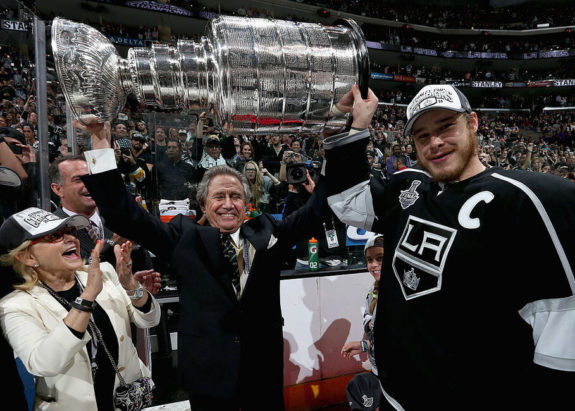
The 10-year contract with NBCSN and NBC was the best thing to happen to the NHL at that time, as it gave the league a home and consistent coverage that helped to legitimize the sport once again.
The NHL Returns to ESPN
When the NHL’s deal with NBC/Universal ended in the summer of 2021, the league looked around at the market and believed they could find a new TV contract that would bring even more exposure and revenue to the league. After a bit of negotiation, they managed to do that.
First, the NHL announced a partnership with the Walt Disney Company to be the primary host of their coverage. This seven-year, roughly $400 million per year deal was seen as a smart, forward-thinking move by the league, as it gave them access to Disney’s media empire, including the juggernaut that still is ESPN and their online streaming services.
The second part of the new TV rights was also a high-risk, high-reward move for the league, as Turner Broadcasting received a seven-year deal to be the secondary hosts of the package for roughly $225 million per year. This will put hockey front and center with another media giant, WarnerMedia, giving them access to a new audience both on cable and through their streaming platforms (who are also known for their stellar NBA coverage, which could be cross-promoted). If this move works, it could be a huge win for the league as they try to expand their viewership into new markets.
Highlights
The other thing the NHL did was to make their videos accessible to anyone. Unlike the MLB, if I want to go out and create a highlight video of Patrick Kane using the NHL’s clips, guess what? I can do it. There are thousands and thousands of highlight packages out there for all types of players. There’s even a dedicated website that archives every single NHL fight, and the best part is, the NHL’s policy allows for it.
In 2010, the NHL adopted the ‘History Will Be Made’ campaign, and it was immediately a home run. These commercials quickly went viral and truly brought out the raw emotion of the playoffs. Thousands of user-created videos flooded YouTube.
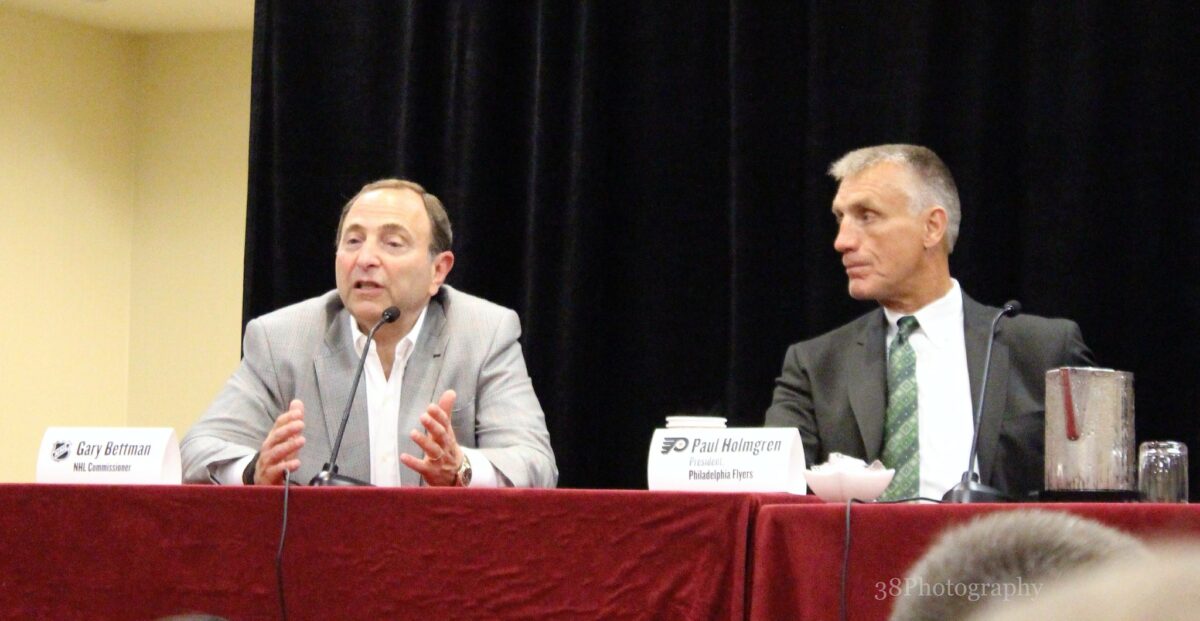
Secondly, the NHL took advantage of YouTube in a variety of ways early on. Since the ‘new NHL’ came about in 2005-06, the NHL has posted clips and highlights of every game that has been played. They aren’t just on their website; they’re on YouTube still, so you can go look up a game from 2006, and it’ll be there.
The NHL’s marketing team has done a brilliant job of getting the game exposure, and that is just another thing that can fall on Bettman’s watch.
The Business Side
The case against Bettman is in part a reaction to the lockouts on his watch. While a legacy of lockouts is hardly good news, the NHL is reaping the benefits today. Before the 2004 lockout, there was absolutely no balance in the NHL. If you’re a ‘rich’ team in the NHL, you could throw everything but the kitchen sink at the most prized free agent.
Take, for example, the Flyers. In 2004, the Flyers were one of the best teams in the Eastern Conference and had their fair share of really decent players. Keith Primeau, John LeClair, Mark Recchi, and Jeremy Roenick were all Flyers at the time. The Flyers had $22 million tied up in just three of those players. Why? Because they could.
That all changed after the 2004-05 lockout. A hard salary cap of $39 million was instituted for the next season. This meant teams like the Flyers couldn’t drop $22 million on three players. The cap did what it was supposed to do. The Penguins became relevant again, the Blackhawks found new life, and those smaller market teams now had a chance to compete for big-name free agents.
Revenues and Imagination
Bettman’s era has brought some important positive changes to the league. Revenues have quintupled in size and player payrolls followed suit. The NHL has played regular-season games in international markets, broadening its global appeal. The league created the successful Winter Classic, the annual outdoor game played on Jan. 1 that has caught the imagination of the U.S. TV viewing public while packing historic stadiums such as Wrigley Field and Fenway Park and even the Cotton Bowl with tens of thousands of fans proudly sporting their teams’ colors.
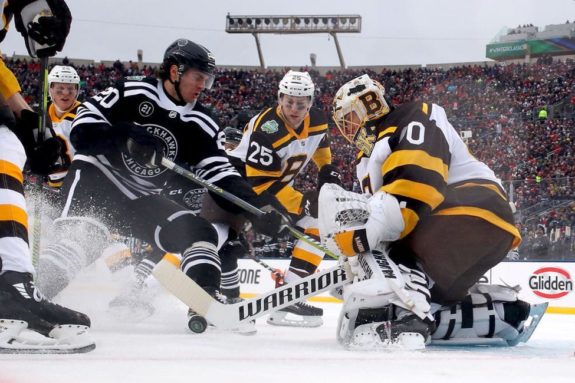
Television revenues have grown significantly as have league sponsorship deals. He helped stabilize wobbly franchises in Edmonton, Calgary, and Ottawa through the Canadian currency-assistance program while enabling Minnesota and Winnipeg to get their franchises back.
Even recent expansions have been huge wins for the NHL. First, the Vegas Golden Knights entered the league by paying roughly $500 million in expansion fees, nearly won the Stanley Cup in their first season, and have gone on to foster one of the largest fanbases in the league in just a handful of years. They capped it off by winning a Stanley Cup in their sixth season as a franchise.
This has been followed up by the Seattle Kraken, who paid roughly $650 million for their expansion fee and went on to sell out their season tickets almost immediately. While the fledgling franchise can’t be called a guaranteed success just yet, it appears that Bettman has found another strong market that is ready to support the NHL for years and hopefully decades to come.
New Challenges
Bettman is a mystery wrapped in an enigma. In some ways, he is brilliant. In other ways, he is totally tone-deaf. The John Scott fiasco is a prime example of why some fans will never warm to Bettman.
The NHL faces new and serious challenges. Is Bettman up to navigating these difficult waters?
Can the league continue to make the business case for expanding into non-traditional markets?
How will the league respond to the discovery of the first case of a living person identified with chronic traumatic encephalopathy, or CTE? The research seemingly cements the relationship between contact sports and brain damage and it will have profound implications for the NHL.
Fans will boo Bettman again. Sometimes, it appears he enjoys it. In assessing his legacy, people struggle to separate the personal from the professional. Some will always consider him to be an outsider, never having been steeped in hockey culture. However, he has been commissioner for 31 years, and it is hard to imagine the NHL without him.
